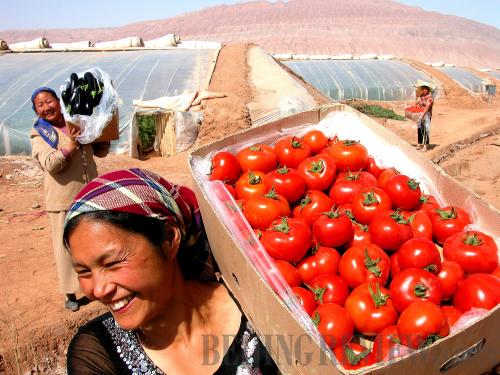|
 |
|
NEW LIFE: Farmers in the Xinjiang Uygur Autonomous Region harvest tomatoes planted in green houses. In its No. 1 Document for 2010, the Central Government committed to a number of measures to stimulate the rural economy and improve the livelihood of farmers (GUO LEI) |
In search of driving forces to keep its economic juggernaut humming, China is pinning great hopes on its vast and relatively underdeveloped countryside as a source of continued economic growth.
On January 31, the Central Committee of the Communist Party of China (CPC) and the State Council jointly released their No. 1 Document for 2010, vowing stiffer efforts to improve the rural economy and boost farmers' incomes. This was the seventh time the government dedicated its first document of the year to an agriculture-related issue.
Indeed, when looking inward for a new source of economic dynamism, China will find no better option than the countryside where the enormous population and rising income present the potential for a consumption boom. In a display of strong resilience, the agricultural sector sailed serenely through the downturn last year, with grain output exceeding 530 million tons. But fears are rising that continuing the feat would be a daunting challenge given poor weather conditions and shrinking farmland.
The Central Government has responded by handing out generous policy incentives to maintain grain output, including cash subsidies for farmers and state purchases of corn, soybean and oilseeds.
In addition, more vigorous efforts will be made to improve rural infrastructure, press ahead with modern agriculture and technological innovations, as well as raise grain yields and quality while stabilizing planting areas, said the document.
Though the investments will add to the country's budget stresses, it will be well worth the effort given their far-reaching implications, said Chen Xiwen, Director of the Office of the Central Rural Work Leading Group, at a news briefing on February 1 in Beijing.
A robust and stable agriculture could lay the groundwork for sustainable economic growth. It could also put inflationary fears at bay, added Chen.
One of the document's highlights was a favorable policy to subsidize rural purchases of construction materials, a measure widely considered a new perk for the rural consumer market.
Li Guoxiang, Deputy Director of the Rural Development Institute under the Chinese Academy of Social Sciences, believed this move was intended to encourage farmers to build better houses and improve their livelihoods.
Since early 2009, China has distributed subsidies, allowing farmers to purchase appliances and vehicles. The document said the program will be continued and widened to cover employees of state-owned farms and forestry firms.
The Chinese Government called for further expansions to rural consumption as part of the country's economic rebalancing to rely more on domestic demands.
A major bottleneck choking the rural economy has been a lack of access to credit. It is not without justification that commercial banks consider vulnerable rural businesses larger risks. The poorly developed credit guarantee system made it even more difficult for farmers to obtain financing. But there are signs that the policymakers are now determined to level that field.
The document said the government would strengthen financial services in rural areas, including micro-credit, village banks and insurance, and require the Agricultural Bank of China and other policy banks to extend long- and medium-term loans to rural infrastructure projects.
The goal was to make banking services available in all villages and towns across China in the next three years, it added.
Another focus of the document was to hasten the integration of rural and urban areas and remove system barriers that are weighing down the prospects of the rural economy.
The government aims to improve the rural pension and healthcare systems to cover more farmers and double efforts to ensure implementation of the policies. It also urged related departments to guide more educational resources and scientific research institutions to tap into the country's vast rural areas.
In addition, enterprises that establish rural welfare foundations will enjoy tax breaks, with no more than 12 percent of their annual profits being deducted before calculation of enterprise income tax, according to the document.
Efforts will also be taken to solve the problems that harm farmers' interests, such as land expropriation, pollution and inappropriate management of village assets, the document said.
Meanwhile, the country will encourage city governments to allow migrant workers who have stable jobs and live in the cities for a certain period of time to join urban housing programs.
The government plans to ease restrictions over permanent residence permits in small cities and townships, so more rural residents can move in and enjoy the same rights and public services as urban residents, said Chen at the press conference.
According to Chen, around 60 percent of China's 150 million migrant workers were born in the 1980s or 1990s, referred to as the "new generation of migrant workers" in the document, and are less acquainted with farming and wish to settle in cities.
It is therefore necessary for policymakers to help integrate them into urban life and give them equal rights as urban residents, added Chen. | 